-
 Bitcoin
Bitcoin $103,961.0257
0.46% -
 Ethereum
Ethereum $2,519.1161
1.30% -
 Tether USDt
Tether USDt $1.0002
0.00% -
 XRP
XRP $2.3995
1.16% -
 BNB
BNB $647.8555
0.87% -
 Solana
Solana $171.3965
1.71% -
 USDC
USDC $0.9998
0.00% -
 Dogecoin
Dogecoin $0.2245
3.85% -
 Cardano
Cardano $0.7620
-1.33% -
 TRON
TRON $0.2730
1.67% -
 Sui
Sui $3.8319
0.87% -
 Chainlink
Chainlink $15.8425
3.01% -
 Avalanche
Avalanche $23.2963
2.14% -
 Stellar
Stellar $0.2924
0.93% -
 Hyperliquid
Hyperliquid $26.9465
1.05% -
 Shiba Inu
Shiba Inu $0.0...01479
3.96% -
 Hedera
Hedera $0.1953
0.96% -
 UNUS SED LEO
UNUS SED LEO $8.7156
-2.40% -
 Bitcoin Cash
Bitcoin Cash $400.9790
1.32% -
 Toncoin
Toncoin $3.1177
1.78% -
 Polkadot
Polkadot $4.7925
1.68% -
 Litecoin
Litecoin $98.9493
-1.77% -
 Monero
Monero $344.3506
1.77% -
 Bitget Token
Bitget Token $5.1439
2.85% -
 Pepe
Pepe $0.0...01326
6.99% -
 Pi
Pi $0.7584
10.22% -
 Dai
Dai $1.0000
0.00% -
 Ethena USDe
Ethena USDe $1.0006
-0.02% -
 Bittensor
Bittensor $431.8051
2.85% -
 Uniswap
Uniswap $6.0300
2.68%
How does zero-knowledge proof achieve cross-chain verification? What are its advantages?
ZKPs enhance blockchain privacy and security by enabling cross-chain verification without revealing sensitive data, ensuring seamless and confidential asset transfers.
May 18, 2025 at 11:07 am
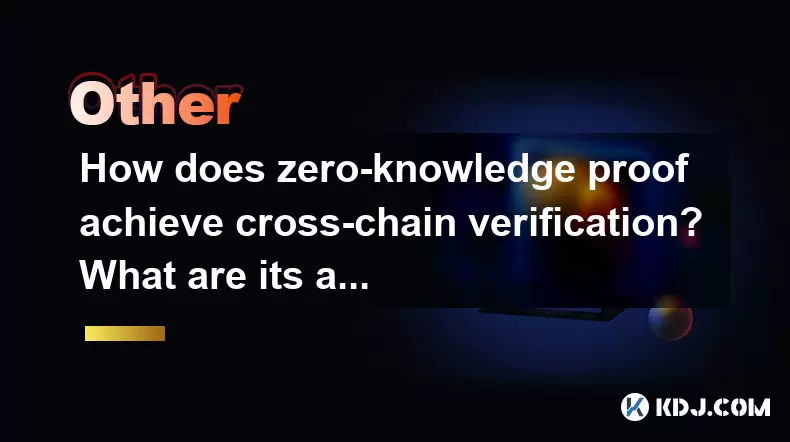
Zero-knowledge proof (ZKP) is a cryptographic method that allows one party to prove to another that a given statement is true, without revealing any information beyond the validity of the statement itself. In the context of blockchain and cryptocurrency, ZKPs play a crucial role in enhancing privacy and security, particularly in cross-chain verification processes. This article will delve into how zero-knowledge proof achieves cross-chain verification and explore its advantages in detail.
Understanding Zero-Knowledge Proofs
Zero-knowledge proofs operate on the principle of proving knowledge without revealing it. In simpler terms, a prover can convince a verifier of the truth of a statement without disclosing the statement itself. This is achieved through an interactive protocol where the prover and verifier engage in a series of challenges and responses.
For instance, consider a scenario where Alice wants to prove to Bob that she knows a secret number without revealing the number itself. Alice and Bob could engage in a protocol where Alice demonstrates her knowledge of the number through a series of mathematical proofs, yet Bob remains unaware of the actual number.
The Role of ZKP in Blockchain
In the blockchain ecosystem, zero-knowledge proofs are instrumental in ensuring transaction privacy and enabling complex smart contract functionalities. They allow users to validate transactions without exposing sensitive data such as the sender's and receiver's identities, the transaction amount, or other transactional details.
This privacy feature is particularly valuable in the context of cross-chain verification, where different blockchains with varying levels of transparency and security need to interact seamlessly.
Achieving Cross-Chain Verification with ZKP
Cross-chain verification involves validating transactions or data across different blockchain networks. This process is challenging due to the inherent differences in blockchain architectures, consensus mechanisms, and security protocols. Zero-knowledge proofs provide a solution by allowing one blockchain to verify the integrity of data from another without needing to trust or understand the underlying mechanics of the other chain.
Here's how ZKPs facilitate cross-chain verification:
Data Hashing and Commitment: The data to be verified is hashed and committed to on the source blockchain. This hash serves as a commitment that can be verified on the target blockchain.
Proof Generation: The prover generates a zero-knowledge proof that the committed data satisfies certain conditions (e.g., a valid transaction). This proof is generated without revealing the actual data.
Proof Verification: The verifier on the target blockchain checks the zero-knowledge proof to confirm its validity. If the proof is valid, the target blockchain can trust that the data from the source blockchain meets the specified conditions.
Interoperability: By using ZKPs, different blockchains can interoperate without compromising their individual security models. This enables seamless data and asset transfers across chains.
Advantages of Using ZKP for Cross-Chain Verification
The use of zero-knowledge proofs in cross-chain verification offers several significant advantages:
Enhanced Privacy: ZKPs allow for the validation of transactions without revealing any sensitive information. This is crucial for users who prioritize privacy and want to keep their financial activities confidential.
Improved Security: By verifying data without needing to trust the source blockchain, ZKPs reduce the attack surface and enhance the overall security of cross-chain interactions.
Scalability: ZKPs can help in reducing the data load on blockchains by allowing for the verification of large datasets with minimal data transfer. This contributes to better scalability of blockchain networks.
Flexibility: ZKPs are versatile and can be adapted to various blockchain protocols and smart contract platforms, making them suitable for a wide range of cross-chain applications.
Practical Implementation of ZKP in Cross-Chain Scenarios
To understand how ZKPs are implemented in cross-chain scenarios, let's consider a practical example involving two blockchains, Chain A and Chain B:
Chain A hosts a smart contract that manages a set of assets. Users on Chain A want to transfer these assets to Chain B.
Hashing and Commitment: The assets on Chain A are hashed, and this hash is committed to on Chain A's blockchain.
Proof Generation: A user on Chain A generates a zero-knowledge proof that the assets are valid and meet the transfer conditions. This proof is generated without revealing the actual assets or the user's identity.
Proof Verification: The proof is sent to Chain B, where a smart contract verifies its validity. If the proof is valid, Chain B can trust that the assets from Chain A are legitimate and can be received.
Asset Transfer: Once the proof is verified, the assets are transferred from Chain A to Chain B, ensuring a secure and private cross-chain transaction.
Real-World Applications of ZKP in Cross-Chain Verification
Several projects and platforms in the cryptocurrency space are leveraging zero-knowledge proofs for cross-chain verification. Here are a few notable examples:
zk-SNARKs in Zcash: Zcash uses zk-SNARKs, a type of ZKP, to enable private transactions. This technology can be extended to facilitate private cross-chain transfers.
StarkWare's StarkEx: StarkEx uses STARKs, another form of ZKP, to enable scalable and private transactions across different blockchains.
Interledger Protocol (ILP): ILP uses ZKPs to ensure secure and private cross-ledger transactions, enabling interoperability between different payment networks.
Challenges and Considerations
While zero-knowledge proofs offer significant benefits for cross-chain verification, there are also challenges and considerations to keep in mind:
Complexity: Implementing ZKPs requires a deep understanding of cryptographic protocols and can be complex to set up and maintain.
Performance: Generating and verifying ZKPs can be computationally intensive, which may impact the performance of blockchain networks.
Standardization: As ZKPs are used across different blockchains, there is a need for standardization to ensure compatibility and interoperability.
Frequently Asked Questions
Q1: Can zero-knowledge proofs be used for any type of blockchain?
A1: Yes, zero-knowledge proofs are versatile and can be implemented on various types of blockchains, including public, private, and consortium blockchains. However, the specific implementation may vary depending on the blockchain's architecture and consensus mechanism.
Q2: Are there any limitations to the size of data that can be verified using ZKPs?
A2: While ZKPs can theoretically handle large datasets, the practical implementation may be limited by computational resources and the complexity of generating and verifying proofs. Advances in ZKP technology continue to improve the efficiency and scalability of these proofs.
Q3: How do zero-knowledge proofs affect the trust model in cross-chain interactions?
A3: ZKPs enhance the trust model by allowing blockchains to verify the integrity of data from other chains without needing to trust the source blockchain. This reduces reliance on intermediaries and improves the overall security and privacy of cross-chain interactions.
Q4: Can ZKPs be used for other purposes besides cross-chain verification?
A4: Yes, zero-knowledge proofs have a wide range of applications beyond cross-chain verification. They can be used for private transactions, identity verification, voting systems, and more, all while maintaining the privacy and security of the involved parties.
Disclaimer:info@kdj.com
The information provided is not trading advice. kdj.com does not assume any responsibility for any investments made based on the information provided in this article. Cryptocurrencies are highly volatile and it is highly recommended that you invest with caution after thorough research!
If you believe that the content used on this website infringes your copyright, please contact us immediately (info@kdj.com) and we will delete it promptly.
- Judge Analisa Torres Denies a Joint Motion from Ripple and the SEC
- 2025-05-18 16:10:13
- French Government to Provide Security Briefings and Priority Access to Emergency Services for Crypto Entrepreneurs and Their Families
- 2025-05-18 16:10:13
- Event recap: TRUMP token and Trump's dinner
- 2025-05-18 16:05:16
- Distrust Spreads Across Cryptocurrency Market-Making Structure Following Token Crash of Movement (MOVE) and MANTRA (OM)
- 2025-05-18 16:05:16
- Meme Market Flips into Overdrive: 3 Explosive Coins to Watch
- 2025-05-18 16:00:31
- Solana’s Favorite Hat-Wearing Meme Coin Is on the Move Again
- 2025-05-18 16:00:31
Related knowledge
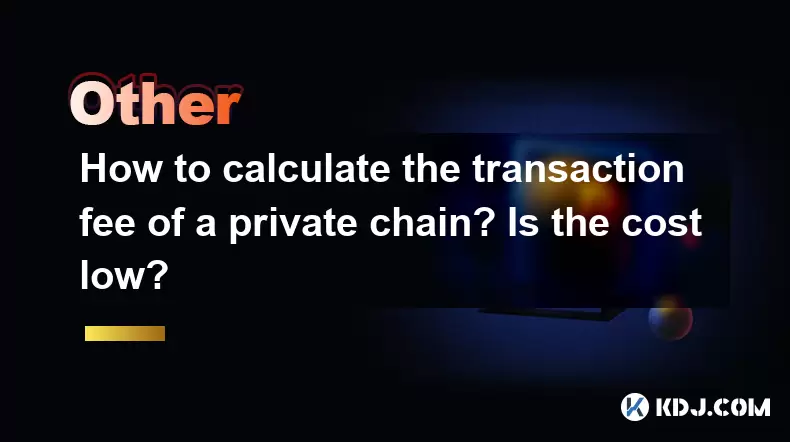
How to calculate the transaction fee of a private chain? Is the cost low?
May 16,2025 at 05:14am
How to Calculate the Transaction Fee of a Private Chain? Is the Cost Low? In the world of cryptocurrencies, understanding the transaction fees associated with different types of blockchains, including private chains, is crucial for users and developers alike. A private chain, also known as a permissioned blockchain, is a blockchain network where access ...
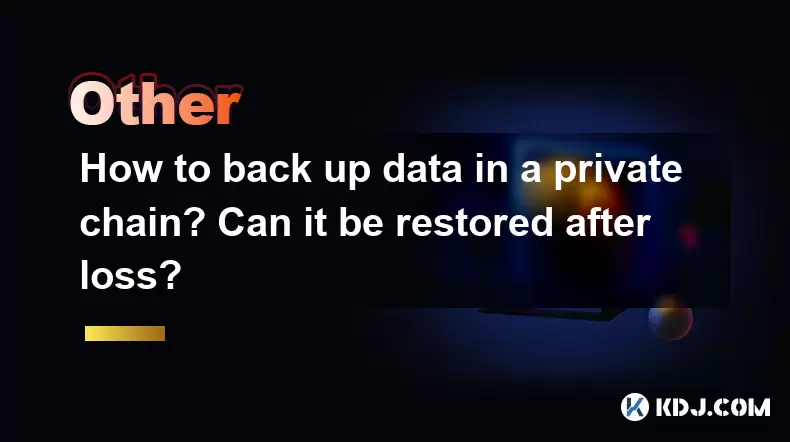
How to back up data in a private chain? Can it be restored after loss?
May 16,2025 at 12:36pm
Introduction to Private Chain Data BackupBacking up data in a private chain is crucial for maintaining the integrity and continuity of your blockchain operations. Private chains, also known as permissioned blockchains, are used by organizations to ensure data privacy and control over network participants. In this article, we will explore the methods for...
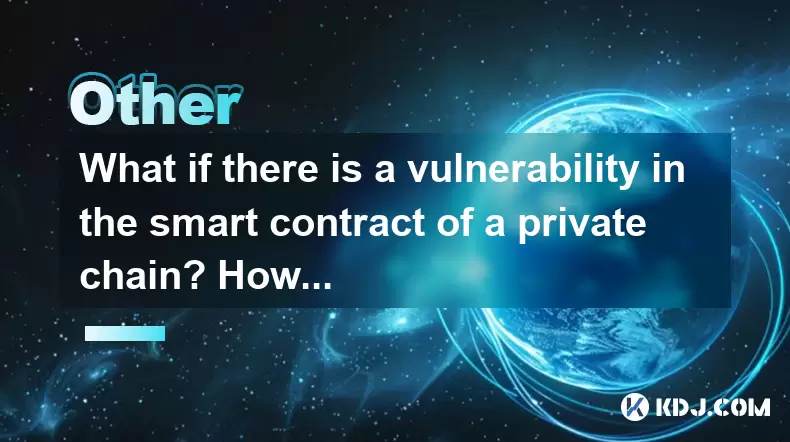
What if there is a vulnerability in the smart contract of a private chain? How to fix it?
May 15,2025 at 08:02pm
Introduction to Smart Contract Vulnerabilities in Private ChainsSmart contracts are self-executing programs that run on blockchain technology, designed to automate transactions and enforce agreements. While they offer numerous benefits, such as transparency and immutability, they are not immune to vulnerabilities. When a vulnerability is found in the sm...
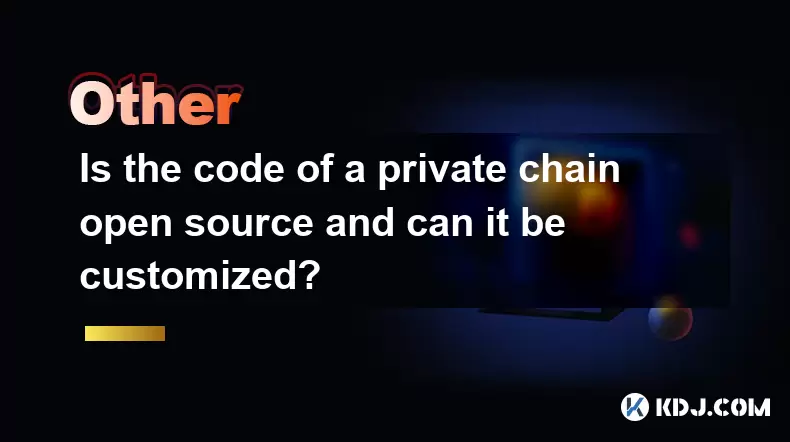
Is the code of a private chain open source and can it be customized?
May 15,2025 at 09:49pm
In the world of cryptocurrencies and blockchain technology, private chains or permissioned blockchains have become a topic of interest for many enterprises and organizations. A private chain is a blockchain network where access is restricted to a specific group of participants, as opposed to public blockchains like Bitcoin and Ethereum, which are open t...
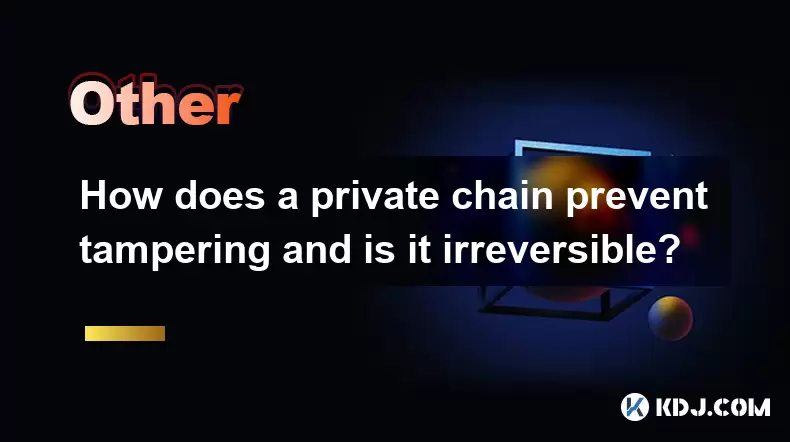
How does a private chain prevent tampering and is it irreversible?
May 17,2025 at 03:01am
Understanding Private ChainsA private chain is a type of blockchain network where access and participation are restricted to a select group of participants. Unlike public blockchains, which are open to anyone, private chains are typically used by organizations or consortia to maintain privacy and control over their transactions and data. This structure ...
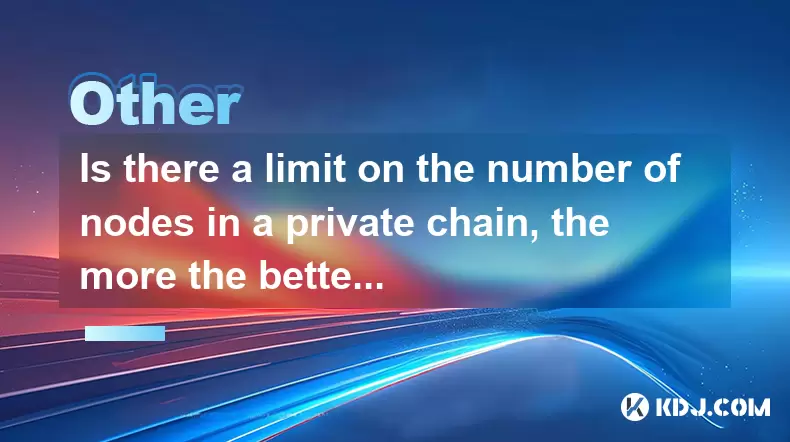
Is there a limit on the number of nodes in a private chain, the more the better?
May 17,2025 at 11:57pm
Understanding Private Chains and Node LimitsIn the world of cryptocurrencies, private chains, also known as permissioned blockchains, are networks where access is restricted to a select group of participants. One of the key components of any blockchain, including private chains, is the node. Nodes are essentially computers that maintain a copy of the bl...

How to calculate the transaction fee of a private chain? Is the cost low?
May 16,2025 at 05:14am
How to Calculate the Transaction Fee of a Private Chain? Is the Cost Low? In the world of cryptocurrencies, understanding the transaction fees associated with different types of blockchains, including private chains, is crucial for users and developers alike. A private chain, also known as a permissioned blockchain, is a blockchain network where access ...

How to back up data in a private chain? Can it be restored after loss?
May 16,2025 at 12:36pm
Introduction to Private Chain Data BackupBacking up data in a private chain is crucial for maintaining the integrity and continuity of your blockchain operations. Private chains, also known as permissioned blockchains, are used by organizations to ensure data privacy and control over network participants. In this article, we will explore the methods for...

What if there is a vulnerability in the smart contract of a private chain? How to fix it?
May 15,2025 at 08:02pm
Introduction to Smart Contract Vulnerabilities in Private ChainsSmart contracts are self-executing programs that run on blockchain technology, designed to automate transactions and enforce agreements. While they offer numerous benefits, such as transparency and immutability, they are not immune to vulnerabilities. When a vulnerability is found in the sm...

Is the code of a private chain open source and can it be customized?
May 15,2025 at 09:49pm
In the world of cryptocurrencies and blockchain technology, private chains or permissioned blockchains have become a topic of interest for many enterprises and organizations. A private chain is a blockchain network where access is restricted to a specific group of participants, as opposed to public blockchains like Bitcoin and Ethereum, which are open t...

How does a private chain prevent tampering and is it irreversible?
May 17,2025 at 03:01am
Understanding Private ChainsA private chain is a type of blockchain network where access and participation are restricted to a select group of participants. Unlike public blockchains, which are open to anyone, private chains are typically used by organizations or consortia to maintain privacy and control over their transactions and data. This structure ...

Is there a limit on the number of nodes in a private chain, the more the better?
May 17,2025 at 11:57pm
Understanding Private Chains and Node LimitsIn the world of cryptocurrencies, private chains, also known as permissioned blockchains, are networks where access is restricted to a select group of participants. One of the key components of any blockchain, including private chains, is the node. Nodes are essentially computers that maintain a copy of the bl...
See all articles
























































































